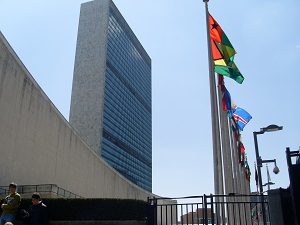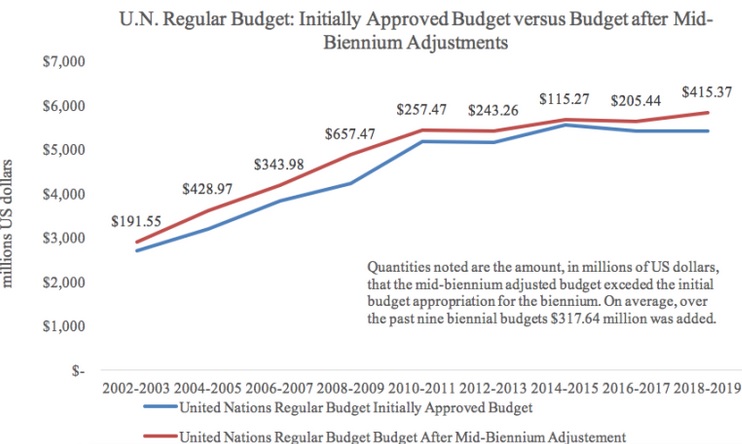Compared to international bureaucracies such as the IMF and OECD, the United Nations has very little power to impose bad policy.
But that does not mean it should be immune from criticism. There’s an anti-market ideology at the UN and I have specifically condemned the bureaucrats for sloppy and misguided work on taxes (here and here), poverty (here and here), and guns (here and here).
Needless to say, there’s also a lot of waste and corruption at the UN.
I wrote about that topic back in 2017, so let’s take a follow-up look at how our tax money is being spent.
Let’s start with a just-released report in the New York Times. Written by David Fahrenthold and Farnaz Fassihi, it is a depressing snapshot of how money is squandered by insiders at the bureaucracy.
At the United Nations, two officials had a problem. The little-known agency they ran found itself with an extra $61 million, and they didn’t know what to do with it. Then they met a man at a party. Now, they have $25 million less. …experienced diplomats entrusted tens of millions of dollars…to a British businessman after meeting him at the party. They also gave his daughter $3 million to produce a pop song, a video game and a website promoting awareness of environmental threats… Things did not go well. …U.N. auditors said the man’s businesses defaulted on more than $22 million in loans — all money meant to aid the developing world…diplomats and former U.N. officials say the tale also demonstrates what critics say is a serious problem with the U.N.: a culture of impunity among some top leaders, who wield huge budgets with little outside oversight. …The top official at the Office for Project Services, Grete Faremo of Norway, remains in her post.
Some of the previous scandals at the UN have involved more than money.
Kathryn Snowdon’s 2018 report in the Huffington Post is very disturbing.
Charity workers from 15 international aid organisations have been implicated in a sex-for-food scandal at refugee camps in west Africa, according to a new leaked report… The 84-page document…identified more than 40 aid organisations “whose workers are alleged to be in sexually exploitative relationships with refugee children”. …Researchers spoke to 1,500 people, and said claims against 67 people were passed to senior UNHCR officials, but…none were prosecuted.
Some readers may wonder if the UN’s failures are the result of inadequate funding.
Hardly. As explained in National Review by Brett Schaefer, the bureaucracy is adept at playing games to ensure it always has plenty of cash.
Between 1960 and 2016, there have only been two times when an initially approved U.N. regular budget was lower than the preceding budget. …the U.N. General Assembly approved a $285 million (5 percent) cut in the two-year regular UN budget for 2018-2019, U.N. watchers took notice, but cautioned that…the U.N. adjusts its two-year budget at the mid-point to account for new expenditures and expenses. …Not only did the “cut” announced by the U.S. Mission to the United Nations…disappear, but the regular budget is actually $130 million higher than the final budget for 2016-2017. …this outcome is typical. …In 2012, the Obama administration bragged that the agreed-upon budget was “the first U.N. regular budget since 1998 – and only the second in the last 50 years – that has gone down in comparison to the previous budget’s actual expense.” The 2012 budget, however, also ended up being significantly higher than the initial budget after mid-biennium additions.
Here’s a chart from the article showing overall spending on the left axis, along with the additional spending that sneaks in during the mid-point of the budget cycle.
Brett explains there is a tiny bit of good news.
…the U.N. regular budget will shift to an annual budget starting in 2020. …This change will help, but will not cure the fundamental problem.
I confess, by the way, that I have no idea if that change actually happened.
But I feel confident in predicting that the UN’s budget has gone up rather than down.
Last but not least, even Richard Haass of the Council on Foreign Relations concedes the United Nations has a dubious track record. Here are some passages from his 2020 article published by Project Syndicate.
The United Nations has fallen far short of its goals to “maintain international peace and security,” “develop friendly relations among nations’’ and “achieve international cooperation in solving international problems.” …The UN Security Council, the most important component of the UN system, has made itself largely irrelevant. …The organization’s own shortcomings haven’t helped: a spoils system that puts too many people in important positions for reasons other than competence, lack of accountability, and hypocrisy (such as when countries that ignore human rights sit on a UN body meant to uphold them).
I’ll close with the observation that I’ve met plenty of nice and sincere people when participating in programs at the United Nations.
But the understanding of economic policy at the UN is utterly abysmal. Until and unless that statist mindset is eliminated, giving more money to the bureaucracy would be rewarding the pursuit of bad policy.
P.S. Maybe international bureaucrats would have a better understanding of economic policy if they weren’t exempt from the income tax.
P.P.S. The United Nations almost surely wastes the talents of some very capable people.
Daniel J. Mitchell is a public policy economist in Washington. He’s been a Senior Fellow at the Cato Institute, a Senior Fellow at the Heritage Foundation, an economist for Senator Bob Packwood and the Senate Finance Committee, and a Director of Tax and Budget Policy at Citizens for a Sound Economy. His articles can be found in such publications as the Wall Street Journal, New York Times, Investor’s Business Daily, and Washington Times. Mitchell holds bachelor’s and master’s degrees in economics from the University of Georgia and a Ph.D. in economics from George Mason University. Original article can be viewed here.
Self-Reliance Central publishes a variety of perspectives. Nothing written here is to be construed as representing the views of SRC.






